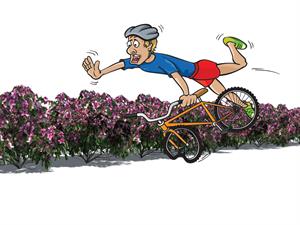PDF chapter test TRY NOW
Framton grabbed wildly at his stick and hat; the hall door, the gravel drive, and the front gate were dimly noted stages in his headlong retreat. A cyclist coming along the road had to run into the hedge to avoid imminent collision.
Explanation:
The section III of the story begins soon after the "ghosts" were spotted and identified. The realisation that the men have come back from the dead had hit Mr Nuttel quite hard. He was so sure that they were ghosts and acted like someone who had seen one- he scooted away!

Mr Nuttel thought that the three figures were ghosts
Mr Nuttel picked his stick and hat and dashed towards the exit.

Mr Nuttel grabbed his stick and hat and ran
The narrator describes how his retreat was so swift and rash that the hall door, gravel drive, and front gate were hardly registered. He calls them the "dimly noted stages in his headlong retreat", describing how he was driven by fear and, as a result, had failed to notice the 'different stages' of his retreat (even though he had crossed them).

Gravel drive
In his haste movement, he almost collided with an oncoming cycle. Had the cyclist not shifted his course, there would have been a crash. However, though Framton Nuttel was unhurt, the poor cyclist had to run into the hedge to avoid being hit.

A cyclist ran into a hedge
The paragraph highlights how terrified and nervous Mr Nuttel had become. He was so overcome by fear and anxiety that he had acted without thinking. It could also suggest that he might have had a nervous breakdown. It becomes ironic since the man who had come to the country to cure his nerves had to face a contradictory experience- his moderately better nerves had just turned worse.
Interestingly enough, Mr Nuttel's actions also suggest that he may not be a reliable friend. For instance, he believed that the visitors were ghosts, yet he never paused to think about the fate of his companions. He left Mrs Sappleton (whom he had believed to be mentally ill) and Vera (a young girl) to face the "horrible ghosts" all by themselves. The least he could have done was to suggest that they also leave the place at once. His action (or the lack of one) shows that he is more self-centred, and hence, it explains why he doesn't have friends.
Another minor detail given in the paragraph reveals fascinating detail about Edwardian etiquette. We see how Mr Nuttel had placed his stick and hat closer to him than near the door. Typically, every English household (especially the elite ones such as Mrs Sappleton’s) would contain a coat-cum-hat hanger and a stick holder near the door. It is a practice among visitors and residents to hang their coats and hats, and drop their sticks as soon as they enter a house. However, the etiquette deems it necessary for a gentleman caller, such as Mr Nuttel, to 'bring their hat and stick/ riding whip with them to their seat. It is to indicate that they didn't intend to stay long'.**
Meanings of difficult words:
S.No | Words | Meanings |
1 | Grab | To take hold of something or someone suddenly and roughly |
2 | Gravel | Small, round stones, often mixed with sand |
3 | Drive | A private area in front of a house or other building onto which you can drive and park your car |
4 | Retreat | An act of moving back or withdrawing |
5 | Headlong | To do something very quick and without much thought; or quickly without considering what you are doing |
6 | Hedge | A line of bushes or small trees planted very close together, especially along the edge of a garden, field, or road |
7 | Imminent | Coming or likely to happen very soon |
8 | Collision | An accident that happens when two vehicles hit each other with force |
Reference:
National Council of Educational Research and Training (2008). The Open Window – Saki (pp. 55 - 61). Published at the Publication Division by the Secretary, National Council of Educational Research and Training, Sri Aurobindo Marg, New Delhi.
